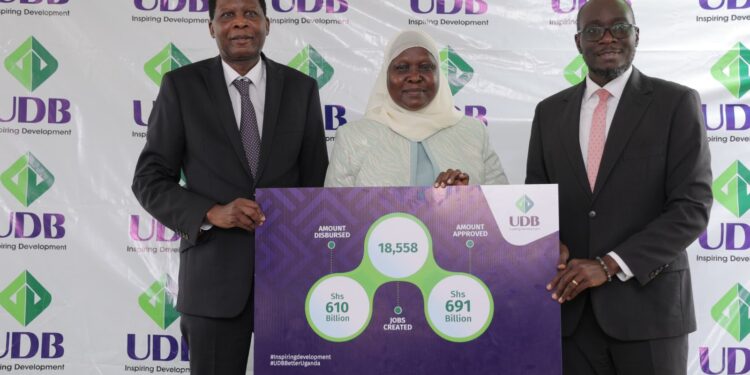Uganda Development Bank (UDB) and XSABO Group on Wednesday held a Press Conference at Nkonge Solar Plant in Mubende District. The solar plant, which seats on 127 hectares of land has 3800 panels (modules), each having a length of 92 metres, according to the Solar Plant’s Site Manager, Eng. Samuel Walusimbi, while conducting a tour of the Plant by Journalists and guests.
Eng. Walusimbi said the solar plant will have the capacity to generate 20 Megawatts (MW), which will be fed to the National Grid upon completion.
Dr. Sarah Wasagali Kanaabi, Electricity Regulatory Authority (ERA) Chairperson, who represented the Minister for Energy, Ruth Nankabirwa, said the Ministry of Energy and Mineral Development launched the National Energy Policy 2023.
“The objective of the new Policy, in part, is to ensure a sustainable, adequate, affordable, and reliable supply of energy, setting an ambitious plan of increasing the Country’s installed generation capacity from the current 1,842 MW to 24,000 MW by 2040, to meet the government’s per capita [annual] consumption goal of 3 668 kWh”,she said.
She said ERA licenses competent Companies interested in investing in the Electricity Supply Industry to undertake any of the aforementioned activities.
“In line with this mandate, after thorough scrutiny of the relevant technical, financial, environmental, and social evaluations, plus considerations, on 28th September 2020, ERA issued a license to Xsabo Nkonge Solarline II to construct and operate this 20 MW solar plant, here in Kyakasa Village, Kasambya Sub-County of Mubende District”, she added.
“Ladies and Gentlemen, once completed, the power generated from 20 MW Xsabo, will interconnect along the 132 kV Kabulasoke-Nkonge Transmission Line and will largely serve Electricity Consumers connected to the Nkonge and Kabulasoke Substations. The plant will push the Country’s grid-connected Solar portfolio to 80.6 MW joining other five plants already connected with a combined capacity of 60.6 MW”, she further pointed out.
She hailed President Yoweri Museveni for prioritizing the Energy Sector and for his relentless support to the Electricity Supply Industry, which has seen it achieve exponential growth.
Dr. David Alobo, Founder and XSABO Group Managing Director, said the Nkonge Solar Power Plant is expected to be fully operational by 31st March 2024.
“What we are waiting for is the solar power plant’s starter which is on the way by ship. We expect to begin full power generation operations after the launch of the plant by 31st March 2024”, he said.
Dr. Alobo said the Nkonge Solar Power Plant is the most modern solar power plant in Sub-Saharan Africa with 20MW and its as big as the Pilot Solar Power Plant of the XSABO Group in Kabulasoke, the largest power plant in East and Central Africa.
He said the total investment volume stands at USD 21 Million (UGX 82.6 Billion).
‘I wholeheartedly thank Uganda Development Bank for providing the loan facility that has enabled successful construction of this solar power plant. It will be ready for commissioning before31 March 2024’, he added.
Patricia Ojangole, UDB Managing Director, appreciated the progress made by XSABO Group to construct and install the Solar plant equipment. In a speech read by UDB Acting Managing Director, Denis Ochieng, Ms. Ojangole said:
“I would like to appreciate our hosts Xsabo Nkonge Solarline for taking the lead in the sustainability agenda of Uganda by supplying solar-generated electricity to the national grid. You have heard that the project will add 20MWac to the national grid, supporting Uganda’s target of attaining 52,481MW of installed capacity by 2040”.
Ms. Ojangole said UDB is proud to associate with such projects that apart from ensuring an ecologically sustainable approach to development, will also generate sustainable development outcomes to include job creation and tax to the government.
During the same function, UDB released a 2023 performance report, with several new targeted funding initiatives towards the private sector and green economy.
UDB report says; funding grew by 21 percent while its total assets rose by 8 percent in a year marked with a roll out of new initiatives towards supporting the private sector.
According to the report, during the year 2023, the Bank approved funding amounting to UGX691 billion to support 201 projects across the country.
“The country’s national Development Finance Institution has today released its 2023 (unaudited results) indicating an 8 percent growth in assets from UGX1.52 trillion in 2022 to UGX1.64 trillion last year”, reads the report in part.
The report says the growth was driven by the increase in gross loans to customers, which inched up by 24 percent to close the period at UGX1.6 trillion.
Ms. Ojangole said during 2023, UDB delivered a strong set of results, consistent with the performance trend over the last couple of years, and in line with the Bank’s role as the country’s Development Finance Institution.
“The Bank continues to make progress on its strategy implementation, fulfilling our primary mandate of generating tangible development outcomes that propel the country’s socio-economic progress. We remain resolute on carefully balancing these efforts with the need to be a financially sustainable institution,” she added.
The UDB report further highlights a slight uptick of 5 percent in borrowing and grants, reaching UGX245 billion from UGX232 billion in December 2022, in which UGX466.5 billion was collected in loan repayments and reinvested to fund disbursements to various enterprises during the year.
Ms. Ojangole added that; consistent with UDB’s strategy to support the key sectors of the economy, the bulk of this approved funding, i.e. 59 percent, targeted the industry sector (agro-industrialization and manufacturing) with UGX409 billion approved to this sector alone.
“A sum of UGX19 billion was allocated to fund primary agriculture activities while UGX223 billion was approved to boost the infrastructure sector.”
“In the same year, actual funds disbursed amounted to UGX610 billion to various projects across the country. Industry took the lion’s share accounting for UGX391 billion and representing 65 percent of the total disbursements, while primary agriculture accounted for UGX38.5 billion, representing 6 percent, and the balance was disbursed to finance other sectors including infrastructure and services including health, education, and tourism”, she pointed out.
Ms. Ojangole reiterated that UDB has continued to make significant strides towards facilitating Uganda’s socio-economic development.
“On this front, 18,558 jobs are expected to be created through the approved projects on top of generating UGX 11.39 trillion in additional output value, UGX 615.96 billion in tax revenue to the Government and UGX 3.3 trillion foreign revenue earnings”, she further pointed out.
During the reporting period, the Bank approved UGX22 billion to support 118 enterprises in this segment and disbursed an additional UGX17 billion to these segments.
According to UDB report, Following its first deployment of Private Equity and Venture capital in December 2022, UDB invested another UGX9.9 billion (with an additional UGX25.3 billion approved) to innovative startups with high impact in sub-sectors like vaccine manufacture, electric-mobility, local paint manufacture, leather value addition, and eco-friendly building materials.
“The Private Equity and Venture capital portfolio caters for the needs of SMEs or other entities such as startups that face challenges in accessing debt financing and require patient capital”, adds the report.
Uganda ranks highly globally, as having an entrepreneurial population. Albeit 70 percent of Ugandan enterprises never make it to their second year. Some of the challenges faced by SMEs today are bookkeeping, governance, sustainability planning, access to markets, access to credit, and financial literacy.
“Through our Business Accelerator for Successful Entrepreneurship (BASE) program, we extended business training to more than 500 enterprises across the country in 2023 of which 291 are to be incubated for funding in the year 2024. 61 percent of the enterprises trained were in the agriculture sector,” Ms Ojangole further said.
She added that under the Bank’s Business Acceleration Program, the Bank has supported 40 projects across the agricultural sector (mainly farmer groups) SMEs, Youth, and Women. The supported projects represent about 5,000 beneficiaries that have benefited from business advisory support, which has enabled them to catalyse and further grow their businesses.
“The Bank has to-date committed UGX5.066 billion towards the preparation of various projects and targeted funding initiatives,” Ms. Ojangole explained.
As the country continues to recover from the devastating effects of COVID-19 and other constraints, there has been a surge in economic activity culminating in the rising demand for long-term credit to catalyze investments in the country. The demand, as has been the trend recently, outstrips the resources available to the Bank.
“I am happy to report that both capitalization and funding towards the Bank grew, meaning we were enabled by the government to realize our strategic goals. The Bank’s funds inched up year-on-year by 12 percent, from UGX1.23 trillion to UGX1.38 trillion attributed to capital Injections by the government during the period and retained and reinvested profits from the prior years, with these sources complemented by additional funding from funding partners”, pointed out Ms. Ojangole.
Do you have a story in your community or an opinion to share with us: Email us at editorial@watchdoguganda.com












